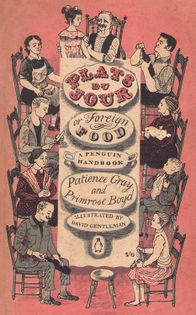Advertisement

Plats du Jour
by Patience Gray and Primrose Boyd
from the publisher
Plats du Jour was first published in 1957. `Long before this book was thought of,' wrote the authors, `we had separately evolved a system of cooking by which a variety of dishes was replaced by a single plat du jour accompanied, as a rule, by a green salad, a respectable cheese, and fruit in season, and, wherever possible, by a bottle of wine. This conception of a meal underlies this book.' It appeared at a time when dishes such as pasta, risotto, soupe aux poireaux et aux haricots or mackerel au vin blanc were still considered outlandish.
Plats du Jour was one of Jane Grigson's favourite books: if ever she saw one in a jumble sale she bought it to give as a present. For, as the well-known food historian, Alan Davidson, wrote, `it is a very good book indeed. Its principal ingredients, the knowledge and amiable enthusiasm of the authors, have given it a lasting value.' And he pointed out that it is a very original cookery book, written in unpretentious language, in an unprescriptive, relaxed way by two cooks with whom it is easy to identify. (They were also running a small business during the two years they were writing Plats du Jour).
David Gentleman believes that `Patience Gray and Primrose Boyd's admirable and practical Plats du Jour [is] every bit as good as Elizabeth David' and many will agree with him. In fact, in terms of sales and influence it was Patience Gray and Primrose Boyd who were the pioneers in introducing English cooks
to French everyday cookery. Plats du Jour sold 50,000 copies in the first few months after publication and 100,000 in the next three years, an astonishing amount at the time. It was only in the 1960s that Elizabeth David started to become a symbol of the transformation of English middle-class eating habits. Before that Plats du Jour was the favourite and influential French cookery book.
Most popular
- Original Publisher
- Penguin
- Date of publication
- 1957
- ISBN
- 1903155606
Recommended by
Vicky Hayward
Food writer
My first cooking was done over a gas burner in a French campsite. This is the book that persuaded me to try my hand and I still like its easygoing everyday feel.
Tom Jaine
Food writer
This changed our outlook in the 1950s, and how. Just love their sense of command and adventure: do this, this way, they do it like that.
Bridget Henisch
Medieval food historian
Bob Granleese
Food Editor, Guardian Weekend
Heather Holden-Brown
Director, HHB Agency Ltd
Advertisement






